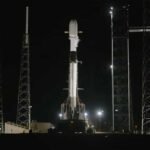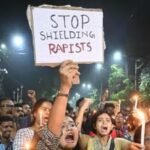US vice president Kamala Harris to visit demilitarised zone on South Korea trip after North’s missile test
US Vice President Kamala Harris is set to visit the demilitarized zone that separates North and South Korea amid South Korea’s warning that North may test SLBMs

United States Vice President Kamala Harris is set to visit the Korean Demilitarized Zone (DMZ) that divides South and North Korea on Thursday, a White House official stated, reported CNN. Her visit will come days after North Korea launched a ballistic missile towards the sea and amid fears of a possible nuclear test by the Kim Jong-un administration.
It is to mention that the DMZ was created to serve as a buffer zone between North Korea and South Korea under the provisions of the Korean Armistice Agreement in 1953, a deal between North Korea, China, and the United Nations Command. It is a more than 255 kilometres-long no-man’s land about 48 Kilometers north of Seoul and it is often described as the world’s most heavily armed border.
As per the White House, the Vice President’s tour to the nation will include visit to the DMZ, meetings with service members, and an operational briefing from US commanders. The White House further reiterated the commitment of the US “to stand beside” South Korea in the face of “any threats” posed by North Korea.
The Vice President “will reflect on the shared sacrifice of tens of thousands of American and Korean soldiers who fought and died together, and will reaffirm that the U.S. commitment to the ROK’s defence is ironclad,” according to the White House official.
RECOMMEND STORIES
- IRCTC’s New Rule: Soon You Can Change Your Travel Date Without Paying a Cancellation Fee
- Dude Movie Review: Pradeep Ranganathan’s Youthful Rom-Com Balances Love, Humor, and cast
- SpaceX Launches 28 Starlink Satellites on Record-Tying 130th Falcon 9 Flight of 2025, Boosting Global Internet Coverage
- 24 Transgender People in Indore Attempt Suicide Seeking Justice, Police Launch Probe and Promise Swift Action
- Cough Syrup 22 Deaths: ED Raids Sresan Pharma Chennai Over Money Laundering Probe
The report of Harris’ visit first came during a bilateral talks between her and South Korean Prime Minister Han Duck-soo, according to reporters traveling with the US VP as she led a United States delegation to Japan for former Prime Minister Shinzo Abe’s state funeral, reported CNN.
“Your visit to the DMZ and Seoul will be very symbolic demonstrations of your strong commitments to the security and peace to Korean Peninsula, and we are working with you and US in dealing with North Korea,” South Korean Prime Minister Han Duck-soo said Monday in a meeting with Harris.
North Korea launched a ballistic missile
On Sunday, North Korea had fired a ballistic missile into the sea off the Korean peninsula’s east coast, South Korean and Japanese officials have confirmed the launch. The defence ministry of South Korea stated that at around 6:53 a.m. (local time), Pyongyang launched a short-range ballistic missile from the Taecheon region of North Pyongan province. The missile seemed to have landed less than 10 minutes after the fire, the Japan Coast Guard reported.
According to a report from VOA, the South Korean Presidential Office had issued a warning the day before, claiming to have seen activities that may have indicated North Korea was getting ready to launch an SLBM from the city of Sinpo on its east coast.
North Korea may test nuclear-capable SLBM amid Harris’ visit, warned S Korea
It is to mention that Seoul had earlier issued a warning that North Korea may test a new ballistic missile during Harris’ visit to South Korea. A Submarine Launched Ballistic Missile (SLBM) is a ballistic missile capable of being launched from submarines and supports carrying a nuclear warhead. As per the reports, the South Korean military detected evidence of preparations for the launch of the missile tests in Sinpo, South Hamgyong Province of North Korea.
Reportedly, the President of South Korea, Yoon Suk-yeol, was aware of the signs and developments regarding North Korea’s possible preparations to conduct such tests.
Previously, Donald Trump had become the first US President to have met a North Korean leader at the DMZ when he held a meeting with Kim Jong-un in June 2019 in an unsuccessful effort to persuade the dictator of North Korea to give up his nuclear and missile programs. North Korea maintains that it has a sovereign right to self-defence, and has accused both the United States and South Korea of a hostile posture toward the country.
Sandeep Raiza — Content Writer, Website Designer, SEO Strategist, and WordPress Expert AI specialist delivering impactful digital solutions that drive business growth.Combining creative storytelling with technical expertise.




